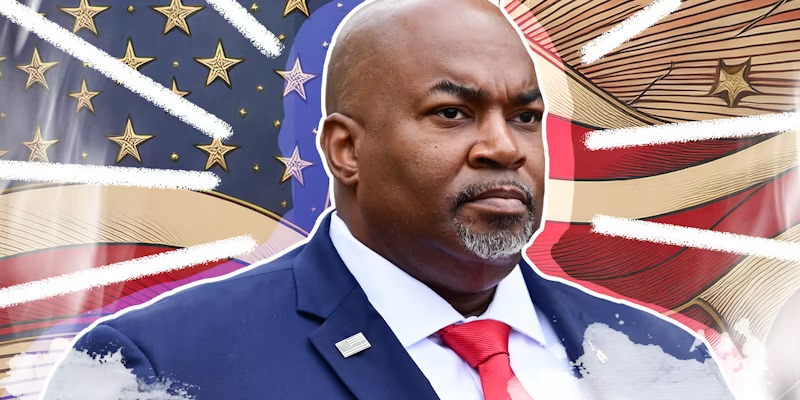Mark Robinson, North Carolina’s Lieutenant Governor and the Republican nominee for the upcoming 2024 gubernatorial election, has rapidly risen to prominence within the state’s political landscape. Known for his fiery rhetoric and staunch conservative positions, Robinson has become a polarizing figure. As the election approaches, he faces escalating scrutiny over past statements and alleged controversial activities. This detailed analysis explores the controversies surrounding his candidacy, the mounting pressure from political opponents and advocacy groups, and the potential ramifications for North Carolina’s political future.
Background: A Meteoric Rise Amid Controversy
From Viral Sensation to Political Figure
Robinson first gained national attention in 2018 when a video of his impassioned defense of Second Amendment rights at a Greensboro City Council meeting went viral. His eloquence and fervor resonated with many who felt underrepresented in political discourse. Capitalizing on this momentum, Robinson was elected Lieutenant Governor in 2020, making history as the first African American to hold the position in North Carolina.
Controversial Statements and Allegations
Robinson’s political career has been marred by a series of contentious statements and allegations that have sparked widespread debate.
Remarks on the LGBTQ+ Community
Robinson has faced significant backlash for his comments regarding the LGBTQ+ community. In a speech at Asbury Baptist Church in June 2021, he referred to topics like homosexuality and transgenderism as “filth”:
“There’s no reason anybody anywhere in America should be telling any child about transgenderism, homosexuality—any of that filth.” — The News & Observer
These remarks prompted calls for his resignation from various advocacy groups and political leaders who argued that such language is harmful and divisive.
Allegations of Holocaust Denial and Antisemitism
In a recent development, reports have surfaced alleging that Robinson made antisemitic remarks and expressed Holocaust denial sentiments on an online message board in 2009. According to an article by Business North Carolina, a partner at an agency working with Robinson’s campaign mentioned that an upcoming CNN story claims Robinson called himself a “Black Nazi,” made derogatory comments about Jewish people, and was racist toward Martin Luther King Jr.
Robinson’s campaign has denied these allegations. Jason Williams, a partner associated with the campaign, stated that Robinson refutes the claims made in the forthcoming report.
Previous Controversies and Reactions
Robinson’s history of making inflammatory statements extends beyond recent allegations.
Stance on Transgender Individuals Using Restrooms
Earlier in 2023, Robinson stirred controversy by suggesting that transgender individuals should use the bathroom outside rather than public restrooms aligning with their gender identity. This stance was widely criticized by LGBTQ+ rights organizations and civil liberties groups.
Comments on Abortion and Personal Conduct
Robinson has been a vocal opponent of abortion, describing it in severe terms. In past social media posts, he has referred to abortion as a “crime against humanity.” Additionally, a previous investigation by WRAL News uncovered that Robinson had paid for an abortion in the past, which he acknowledged, framing it as a regrettable decision.
Pressure from Political Opponents and Advocacy Groups
Calls for Withdrawal from the Gubernatorial Race
Following the latest allegations, there are reports that Robinson is facing pressure from staff members and associates of former President Donald Trump’s campaign to withdraw from the gubernatorial race. The Carolina Journal reported that this pressure is linked to concerns over the potential impact of the allegations on the Republican Party’s prospects in North Carolina.
Reactions on Social Media and Public Discourse
Speculation about the impending CNN report has generated significant attention on social media platforms. Users on X (formerly Twitter) have expressed anticipation and concern over the nature of the allegations. Some have highlighted that despite Robinson’s history of controversial remarks, these new allegations are particularly serious.
“Expectations are high that the Mark Robinson scandal is about to be one of the most insane stories about a US politician in a very long time.” — X user, as reported by The Daily Dot
Others have pointed out that previous controversies did not lead to Robinson’s withdrawal, questioning the potential impact of the new allegations.
Robinson’s Response to the Allegations
Denial of Claims and Continuation of Campaign
Robinson’s team has firmly denied the allegations presented in the forthcoming CNN report. According to the National Review, his campaign stated that he has no intention of dropping out of the race. The deadline to withdraw was reportedly imminent, but Robinson chose to continue his candidacy.
Cancellation of Campaign Events
In response to the unfolding situation, Robinson reportedly canceled campaign events scheduled for the day the allegations surfaced. This move has been interpreted by some as a strategic decision to manage the situation, while others speculate it may indicate the seriousness of the allegations.
Impact on the Gubernatorial Race and Political Climate
Deepening Divisions and Polarization
The allegations against Robinson are likely to intensify existing political divisions within North Carolina. His supporters may view the reports as politically motivated attacks, while opponents may see them as confirmation of unfitness for office. This polarization could affect voter engagement and turnout.
Implications for the Republican Party
The Republican Party in North Carolina may face challenges in rallying around a candidate embroiled in controversy. Internal pressures and strategic considerations might lead to discussions about alternative candidates or damage control measures to preserve the party’s image.
Voter Perception and Media Influence
The media’s role in reporting and framing the allegations will significantly influence voter perception. Comprehensive and balanced coverage is essential to ensure that the electorate is informed without sensationalism.
The Role of Media and Upcoming Reports
Anticipation of the CNN Report
The anticipated CNN report is expected to provide detailed accounts of the allegations against Robinson. The impact of this report will depend on the credibility of the evidence presented and the public’s reception.
Social Media Dynamics and Public Opinion
Social media platforms are amplifying discussions about Robinson, with many users expressing strong opinions. The viral nature of these discussions can sway public opinion and influence the narrative surrounding his candidacy.
Robinson’s Previous Engagements and Public Image
Allegations of Past Activities
Reports have resurfaced alleging that Robinson frequented adult entertainment venues in the 1990s. An investigation by a local North Carolina outlet suggested that he watched adult content in private booths multiple times a week during that period. Robinson has not publicly addressed these specific allegations.
Advocacy for Conservative Principles
Despite controversies, Robinson continues to advocate for conservative principles, including Second Amendment rights, pro-life policies, and traditional educational values. His supporters appreciate his straightforward approach and willingness to challenge what they perceive as liberal agendas.
The Broader Political Context in North Carolina
Demographic and Cultural Shifts
North Carolina is experiencing demographic changes, with increasing urbanization and a more diverse population. These shifts are contributing to evolving political attitudes and priorities among voters.
Historical Precedents
The state has a history of closely contested elections and shifting political tides. The outcome of the gubernatorial race could signal broader trends in regional and national politics.
Mark Robinson’s gubernatorial campaign is at a critical juncture amid escalating allegations and scrutiny. The unfolding situation presents challenges not only for his candidacy but also for the Republican Party in North Carolina. As new information emerges, voters will need to critically assess the credibility of allegations, the responses from Robinson and his campaign, and the broader implications for the state’s leadership. The upcoming election holds significant weight for North Carolina’s future direction and the political climate at large.

